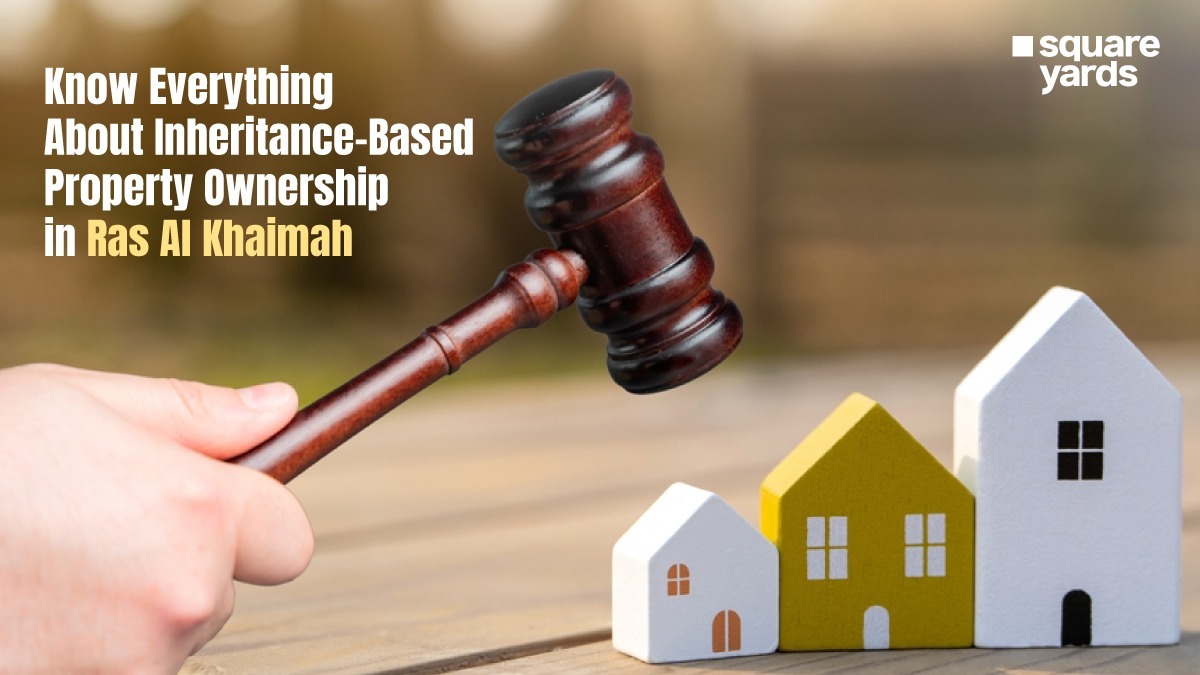Inheritance-based property ownership in Ras Al Khaimah (RAK) allows heirs to claim property passed down from a deceased family member. Under RAK inheritance law, if the deceased has left a will, the property is distributed according to their wishes. Without a will, the property is divided according to Islamic Sharia Law. Non-Muslim residents are governed by the laws of their home country for property inheritance in RAK.
Let’s explore the key aspects of inheritance property RAK and how to manage your claims efficiently.
What are the RAK Inheritance Laws?

Under Ras Al Khaimah inheritance law and the UAE Federal law, the distribution of inherited property depends on the presence of a will and the religion of the deceased:
-
For Muslims
Islamic Sharia Law governs property distribution, ensuring family members divide assets based on specific percentages.
-
For Non-Muslims
If a legally verified will exist, the legal framework of their home country applies. Without a will, RAK property inheritance is typically shared equally between the spouse and children.
Ras Al Khaimah offers an efficient e-service for RAK property transfer after death to make the process seamless. This service allows heirs to submit documents online and receive a new title deed within seven working days. The documents include the title deed, site plan, identification, and payment of a service fee based on the property type.
Suppose you are a direct inheritor or a delegate on an heir’s behalf. In that case, understanding the RAK property ownership rights and preparing the necessary documents is essential for a smooth and successful claim. For guidance, individuals may seek RAK property legal advice to ensure all legal requirements are met.
-
The Role of Islamic Sharia Law
Islamic Sharia Law, aligned with RAK inheritance law and UAE Federal Law No. 5 of 1985, plays a significant role in property ownership inheritance in RAK.
For Muslim citizens, it specifies fixed portions for family members like spouses, children, and parents. If no will exists, Sharia law governs the inheritance property RAK, ensuring fair distribution. This framework ensures compliance with both religious and legal norms.
-
UAE Federal Law for Non-Muslim Heirs in RAK
For non-Muslim residents, RAK property inheritance follows their home country’s legal frameworks, provided a legally verified will is in place. Without a will, the RAK inheritance process generally divides the estate among the spouse and children, based on the RAK property transfer after death guidelines.
Understanding RAK property ownership rights and Ras Al Khaimah property law is essential to avoid disputes or tax implications. Moreover, seeking legal advice on RAK property can help ensure a smooth and legal transfer of property ownership.
-
Significance of the Ras Al Khaimah Court
The Ras Al Khaimah Court is pivotal in regulating RAK property inheritance. Key functions include:
-
- Enforcing Ras Al Khaimah property law and resolving disputes.
- Overseeing RAK property transfer after death and ensuring compliance with inheritance laws.
- Validating wills and issuing rulings on contested cases.
- Facilitating legal advice on RAK property ownership rights to guide heirs effectively.
How to Register Property Ownership Based on Inheritance in Ras Al Khaimah

Follow these steps for registering property ownership inheritance in RAK:
- Create an account on the official RAK Municipality portal.
- Navigate to the “Ownership Based on Inheritance” section and submit your application.
- Upload all the required documents, including the title deed and site plan.
- Pay the service fee to process the registration.
- The concerned department will review the application. If all requirements are met, the request will be approved.
- After approval, the RAK Municipality will issue a new title deed. You can receive it by email or collect it from the Customer Happiness Centre.
To begin the property inheritance RAK registration process, the following documents are required:
-
- Title Deed
- Site Plan
- Inheritor’s Emirates ID
- Building Permits
- Complete Certification
- Limitation of Inheritance
- Power of Attorney (if applicable)
-
Fees for Property Inheritance RAK:
The fees vary on the property type, such as –
|
Housing and Agricultural Land Fees |
|
|
Property Type |
Fees (AED) |
|
Empty Housing Land |
1,000 |
|
Built Housing Land |
1,500 |
|
Empty Agricultural Land |
2,000 |
|
Planted Agricultural Land |
2,500 |
|
Trading and Manufacturing Land Fees |
|
|
Property Type |
Fees (AED) |
|
Empty Trading Land |
1,000 |
|
Built Trading Land |
2,000 |
|
Empty Manufacturing Land |
2,000 |
|
Built Manufacturing Land |
2,000 |
|
Empty Housing Trading Land |
2,000 |
|
Built Housing Trading Land |
2,000 |
Conclusion
Claiming property ownership inheritance in RAK follows a systematic process under RAK inheritance law and Sharia Law for Muslims. At the same time, non-Muslims use their legal framework with a confirmed will. Hiring an RAK property lawyer ensures smooth legal handling and proper documentation. Tools like the RAK inheritance e-service will further simplify property registration as laws evolve.
Similar Suggestions For You:
|
Explore Tenancy Contract Registration In Ras Al Khaimah |
|
|
Before You Invest in a Property |
|
|
Understand about Terminate the Sales and Purchase Agreement |
|
|
How Real Estate Voilations System (RVS) Dubai |
Frequently Asked Questions (FAQ’s)
How do I submit an ownership request as a delegate of an inheritor?
As a delegate, you must provide a Power of Attorney, the Emirates ID of the delegate and inheritor and all required documents, including the title deed and site plan. This ensures compliance with the RAK inheritance process for property ownership inheritance in RAK.
Does inheritance based on Islamic Sharia Laws apply to Non-Muslims too?
No, Islamic Sharia Law only applies to Muslims. RAK property inheritance for non-Muslim heirs follows their home country's legal framework, provided a verified will exists. Without a will, the property is generally divided equally between the spouse and children.
Who are the legal heirs in UAE?
Legal heirs in the UAE include the spouse, children, and other family members. For Muslims, RAK inheritance law follows Islamic Sharia Law, while non-Muslims follow the rules of their home country, assuming a verified will is in place.



































